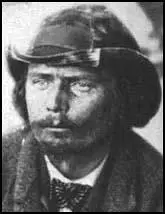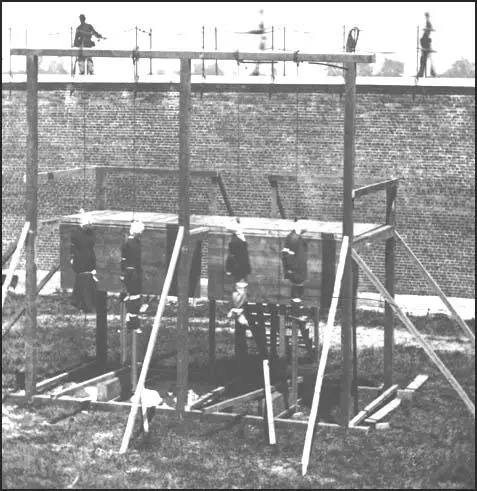George Atzerodt

George Atzerodt was born in Thurlingen, Germany, on 12th June, 1835. Eight years later his family emigrated to the United States and settled in Maryland.
Atzerodt established a carriage repair business with his brother at Port Tobacco. During the American Civil War Atzerodt obtained extra money by helping Confederate agents to cross the Potomac River. One of the men he helped was John Surratt who invited him to Washington. While he was in the city he met Mary Surratt and John Wilkes Booth. Atzerodt stayed at Surratt's boarding house but was asked to leave after she discovered that he had been drinking alcohol in his room.
In 1864 John Wilkes Booth devised a scheme to kidnap Abraham Lincoln in Washington. The plan was to take Lincoln to Richmond and hold him until he could be exchanged for Confederate Army prisoners of war. Others involved in the plot included Atzerodt, Lewis Powell, John Surratt, David Herold, Michael O'Laughlin and Samuel Arnold. Booth decided to carry out the deed on 17th March, 1865 when Lincoln was planning to attend a play at the Seventh Street Hospital that was situated on the outskirts of Washington. The kidnap attempt was abandoned when Lincoln decided at the last moment to cancel his visit.
On 9th April, 1865, General Robert E. Lee surrendered to General Ulysses S. Grant at Appomattox. Two days later Booth attended a public meeting in Washington where he heard Abraham Lincoln make a speech where he explained his views that voting rights should be granted to some African Americans. Booth was furious and decided to assassinate the president before he could carry out these plans.
John Wilkes Booth persuaded most of the people who had been involved in the kidnap plot to join him in his plan. Booth discovered that on 14th April, Abraham Lincoln was planning to attend the evening performance of Our American Cousin at the Ford Theatre in Washington. Booth decided he would assassinate Lincoln while Lewis Powell would kill the Secretary of State William Seward. Atzerodt was given the task of murdering Vice President Andrew Johnson. All attacks would take place at approximately 10.15 p.m. that night.
Atzerodt rented a room close Kirkword House where Johnson was staying on 14th April. He also asked questioned a local bartender about Johnson's movements. However, unlike John Wilkes Booth and Lewis Powell, Atzerodt made no attempt to assassinate his intended victim.
When detectives began investigating the murder of Abraham Lincoln they were soon given the name of Atzerodt as being one of Booth's close friends. Detective John Lee searched Atzerodt's rented room and found evidence that he had been involved in the conspiracy plot.

George Atzerodt at Washington Penitentiary on 7th July, 1865.
Atzerodt was arrested on 20th April at the home of his cousin, Hartman Richer, who lived in Germantown, Maryland. He was charged with being involved in the conspiracy to murder Lincoln.
On 1st May, 1865, President Andrew Johnson ordered the formation of a nine-man military commission to try the conspirators. It was argued by Edwin M. Stanton, the Secretary of War, that the men should be tried by a military court as Lincoln had been Commander in Chief of the army. Several members of the cabinet, including Gideon Welles (Secretary of the Navy), Edward Bates (Attorney General), Orville H. Browning (Secretary of the Interior), and Henry McCulloch (Secretary of the Treasury), disapproved, preferring a civil trial. However, James Speed, the Attorney General, agreed with Stanton and therefore the defendants did not enjoy the advantages of a jury trial.
The trial began on 10th May, 1865. The military commission included leading generals such as David Hunter, Lewis Wallace, Thomas Harris and Alvin Howe and Joseph Holt was the government's chief prosecutor. Mary Surratt, Lewis Powell, George Atzerodt, David Herold, Samuel Mudd, Michael O'Laughlin, Edman Spangler and Samuel Arnold were all charged with conspiring to murder Lincoln. During the trial Holt attempted to persuade the military commission that Jefferson Davis and the Confederate government had been involved in conspiracy.
Joseph Holt attempted to obscure the fact that there were two plots: the first to kidnap and the second to assassinate. It was important for the prosecution not to reveal the existence of a diary taken from the body of John Wilkes Booth. The diary made it clear that the assassination plan dated from 14th April. The defence surprisingly did not call for Booth's diary to be produced in court. On 29th June Atzerodt was found guilty. Atzerodt, along with Mary Surratt, Lewis Powell and David Herold were hanged at Washington Penitentiary on 7th July, 1865.
Primary Sources
(1) Sergeant L. W. Gemmill, testimony before the Military Tribunal investigating the assassination of President Abraham Lincoln (17th May, 1865)
I arrested the prisoner, George A. Atzerodt on the 20th April, about 4 o'clock in the morning, at the house of a man named Richter, near a place called Germantown. I was sent there for the purpose by Captain Townsend, with a detail of six men. When I knocked on the door, Richter asked me twice who it was before he would let me in. I told him to come and see. When he came to the door I told him I was going to search the house. He got a light, and taking two men with me, went up the stairs, where I found Atzerodt lying on the front of the bed. I asked him his name, and he gave me a name I did not understand, and which I thought was a fictitious one. I told him to get up and dress himself; and took him to Mr. Leaman, a loyal man, who knew him. Mr. Leaman told me he was the man. Atzerodt made no inquiry as to why he was arrested.
(2) Marcus Norton, George Robinson, testimony before the Military Tribunal investigating the assassination of President Abraham Lincoln (3rd June, 1865)
From about the 10th January until about the 10th March, I was staying at the National Hotel in Washington. I knew John Wilkes Booth, having seen him several times in the theatre. I saw the prisoners, George Atzerodt and Michael O'Laughlin, prior to the inauguration of President Lincoln. I saw Atzerodt twice and O'Laughlin three or four times, in conversation with Booth.
(3) William Doster, the former provost marshal of Washington, defended George Atzerodt in court. He failed in his attempts on 30th May, 1865, to persuade the Military Tribunal to allow Atzerodt's original confession that he made to Captain Frank Monroe to be placed before the court.
William Doster: I wish to submit an application of the prisoner in writing. This is a proposal on the part of the prisoner, Atzerodt, that his confessions made to Captain Frank Monroe shall be heard by this court as testimony in his favour. He asks his statement to be placed on record, because he has been debarred from calling any other prisoners who might be his witnesses, for the reason they are his co-defendants.
Judge Advocate: It is greatly to be deplored that the counsel for the accused will urge upon the court proposals which they know to be contrary to law.
(4) Ben Pittman, The Assassination of President Lincoln and the Trial of the Conspirators (1865)
Atzerodt is a short, thick-set, round-shouldered, brawny-armed man with a stupid expression, high cheek-bones, a sallow complexion, a small grayish-blue eyes, tangled light-brown hair, and straggling sandy whiskers and mustache.
(5) Captain Christian Rath, was placed in charge of the execution of Mary Surratt, Lewis Powell, George Atzerodt, David Herold, Michael O'Laughlin, Edman Spangler and Samuel Arnold. He was later interviewed about his role in the event.
I was determined to get rope that would not break, for you know when a rope breaks at a hanging there is a time-worn maxim that the person intended to be hanged was innocent. The night before the execution I took the rope to my room and there made the nooses. I preserved the piece of rope intended for Mrs. Surratt for the last.
I had the graves for the four persons dug just beyond the scaffolding. I found some difficulty in having the work done, as the arsenal attaches were superstitious. I finally succeeded in getting soldiers to dig the holes but they were only three feet deep.
The hanging gave me a lot of trouble. I had read somewhere that when a person was hanged his tongue would protrude from his mouth. I did not want to see four tongues sticking out before me, so I went to the storehouse, got a new white shelter tent and made four hoods out of it. I tore strips of the tent to bind the legs of the victims.
(6) William Coxshall, a member of the Veteran Reserve Corps, was assigned the task of dropping the trapdoor on the left side of the gallows.
The prison door opened and the condemned came in. Mrs. Surratt was first, near fainting after a look at the gallows. She would have fallen had they not supported her. Herold was next. The young man was frightened to death. He trembled and shook and seemed on the verge of fainting. Atzerodt shuffled along in carpet slippers, a long white nightcap on his head. Under different circumstances, he would have been ridiculous.
With the exception of Powell, all were on the verge of collapse. They had to pass the open graves to reach the gallows steps and could gaze down into the shallow holes and even touch the crude pine boxes that were to receive them. Powell was as stolid as if he were a spectator instead of a principal. Herold wore a black hat until he reached the gallows. Powell was bareheaded, but he reached out and took a straw hat off the head of an officer. He wore it until they put the black bag on him. The condemned were led to the chairs and Captain Rath seated them. Mrs. Surratt and Powell were on our drop, Herold and Atzerodt on the other.
Umbrellas were raised above the woman and Hartranft, who read the warrants and findings. Then the clergy took over talking what seemed to me interminably. The strain was getting worse. I became nauseated, what with the heat and the waiting, and taking hold of the supporting post, I hung on and vomited. I felt a little better after that, but not too good.
Powell stood forward at the very front of the droop. Mrs. Surratt was barely past the break, as were the other two. Rath came down the steps and gave the signal. Mrs. Surratt shot down and I believed died instantly. Powell was a strong brute and died hard. It was enough to see these two without looking at the others, but they told us both died quickly.

